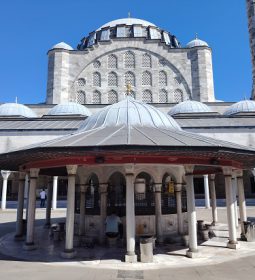Another Ayodhah tradegy is comings: Hindu nationalists say Shrine of Mu’in al-Din Chishti – an ancient Hindu temple for god Shiva

Indian court petition claims Hindu temple buried under revered Muslim shrine

An Indian court in the state of Rajasthan has accepted a petition from a right-wing Hindu group claiming that the shrine of a revered Muslim Sufi saint and philosopher is sitting on top of a temple for the Hindu god, Shiva.
The court’s acceptance of the petition on Wednesday means the court will hear the case and ultimately decide whether the shrine of Mu’in al-Din Chishti should be declared a Hindu temple or remain a shrine.
The right-wing group behind the petition, Hindu Sena, was founded in 2011 and is headed by Vishnu Gupta. The group’s activists vandalised a Pakistan International Airlines office in New Delhi, India, in 2016.
In 2017, the group held a birthday party celebrating Donald Trump, then a presidential candidate, calling him “the savior of humanity”.
The Mu’in al-Din Chisti shrine, located in the city of Ajmer, is one of the most revered among Muslims in India. Chishti was a 13th-century philosopher and Sufi mystic, and after his death, his tomb became a venerated site.
He also introduced the Chishti Sufi order into the Indian subcontinent, which is now one of the most prominent Sufi orders in the subcontinent.
The petition has sparked anger from the Indian Muslim community, who have on multiple occasions had to deal with Hindu groups trying to destroy Islamic sites over claims Hindu sites are buried underneath.
The most prominent of these cases was the Babri Mosque in Ayodha. In 1992, Hindu mobs destroyed the 16th-century mosque, sparking the worst religious riots in India since independence and partition.

The riots killed more than 2,000 people, most of them Muslims.
After a lengthy court battle, a Hindu temple dedicated to the deity Ram was built on top of the destroyed mosque. The temple was officially opened in January 2024.
In India, under Prime Minister Narendra Modi, the idea of Hindutva – sometimes known as Hindu nationalism – has become more popular, but at the expense of minority groups, including Muslims, Sikhs and Christians.
Rights organisations have pointed to several instances of anti-Muslim policies in India under Modi, including revoking the special autonomous status of the Muslim-majority Kashmir, demolishing Muslim properties and banning the hijab in Karnataka province, where Modi’s Bharatiya Janata Party rules.
- Previous Taiwan’s rare honey-flavored tea Gui Fei Oolong – 9th worlds’ wonder! May be…
- Next Next Post
















